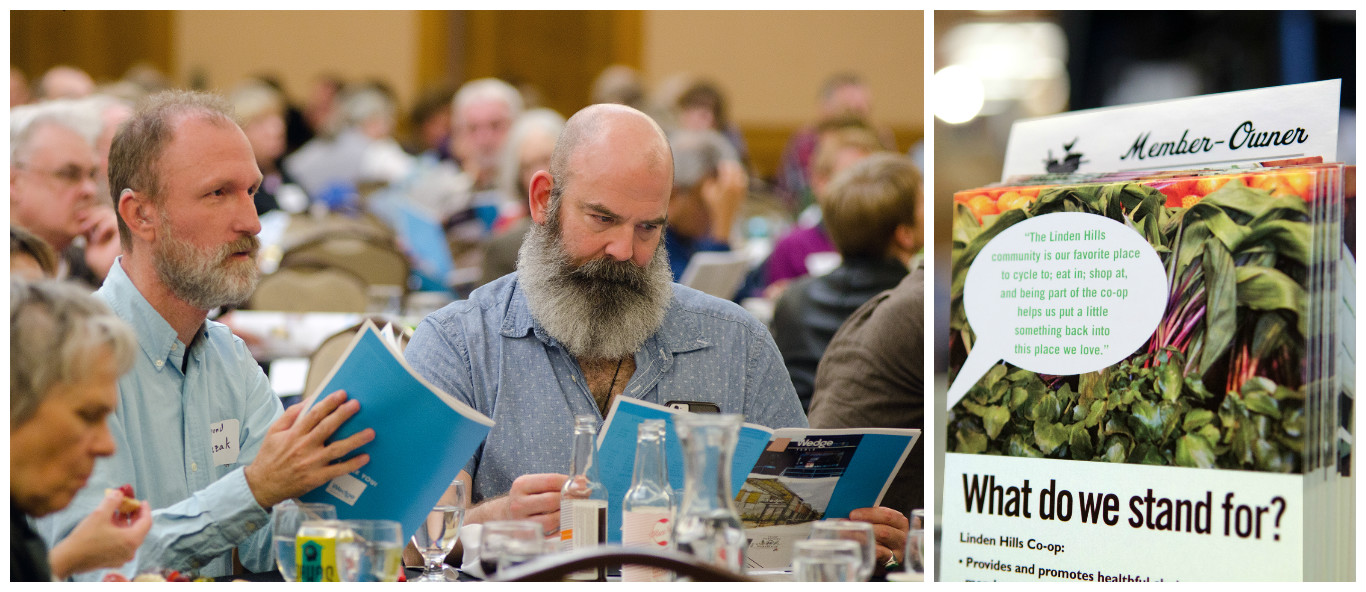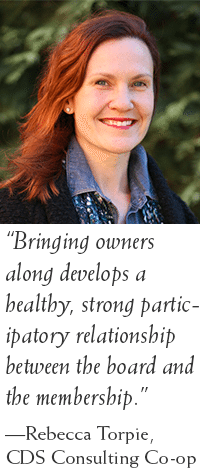
How is your board spending its time? It’s easy to get caught up in the delegation and accountability portion of a board’s job. Yet there’s a whole other side to the work that is equally important, and the ultimate endeavor of the board: spending time thinking about the co-op’s desired outcomes, members and member needs.
A board is accountable for results produced, but ends don’t end with policies created. A board is also responsible to the membership to take the lead on thinking about the future, and including owners in that work is an important part of the process of creating trust through transparency. Bringing owners along as the board gains wisdom and knowledge develops a healthy, strong participatory relationship between it and the membership.
So, what are some of the ways that a board can learn while having an intentioned, open dialogue about ends with owners? Many activities likely are already in action at your co-op, but they may not be maximizing the connection to owners. Here are some things to consider regarding including members in the co-op’s ends dialogue:

- Regular board meetings can be a foundation for transparency and a call for input. Be careful not to let a focus on policies and reports overshadow time for strategic direction and ends reflection. Design in meeting time for building wisdom and knowledge: have discussions about trends and topics of interest, in addition to time spent examining ends policies. Identify a subject relevant to your co-op’s future you think might need some cognitive exercise and explore.
- It’s important that all owners are linked to the board’s work, whether or not they attend meetings—and meeting minutes don’t do justice communicating them. Try to go beyond just having transparency around your process. Actively telling the board’s story and consistently asking for input acts in your favor; owners will notice.
- Writing about topics the board is learning about or sharing board discussions is an important way to keep the communication lines open to the membership. Use the newsletter or website, ideally creating a consistent pattern that readers can expect, and always ask for ideas and information.
- Use the annual or ends report as a strategic tool for connecting to current and future members and to connect to the co-op’s multi-year framework, in addition to benchmarking the year’s successes. Discuss the questions: What path are we on? Where are we going? Do our accomplishments indicate we are making progress in our desired direction?
- At least some of the content of the annual meeting should be connected to the board’s thinking around the end’s inquiry process. Ideally, you’ve already made the case for the work you’re doing and you’re punctuating that work with activities and speakers at annual meetings. Invite speakers and plan activities that are reflective of the wisdom and knowledge you are learning and ask for input at the meeting. The annual meeting’s attendance is typically low relative to total membership, so plan to follow up with a written communication of highlights and important information that is shared with the larger membership body. Keep the conversation going by posting a well-edited, short video of the highlights of the annual meeting on the co-op’s website and social media platforms.
- Boards can also take advantage of scientific sampling methods rather than just rely on invitations to participation. Owner surveys capture a representative subset of the membership, and boards can use this information substantively. Craft your survey carefully: What precisely are you trying to learn? Consider using professional survey resources over homegrown versions to gain full advantage of the best methodologies.
- Be transparent about the fact that you’re working on this process of gaining knowledge and wisdom to impact co-op results. When owners can see where a board is going and understand why, the board can elevate itself to being a trusted agent of owners and their needs. Sharing what you are learning is a check to see if you’re in touch with your membership. Review your work with them and don’t be afraid to ask: “What do you think? Are there things you are thinking about that you don’t see on our list?”
- Taking the time to intentionally focus on co-op goals and including members in that process is a great way not only to help boards think strategically about their co-op’s future needs. It can serve as a powerful engagement tool that invites owners into meaningful dialogue that can create positive mutual impact.
Ends is used here to refer to the objectives or goals of the Cooperative, and for those Cooperatives using John Carver’s Policy Governance® Model encompasses the broader concepts embodied in that model. Policy Governance® is an internationally registered service mark of John Carver. Registration is only to ensure accurate description of the model rather than for financial gain. The model is available free to all with no royalties or license fees for its use. The authoritative website for Policy Governance is www.carvergovernance.com.
Have more questions?
Get in touch with one of our consultants.
